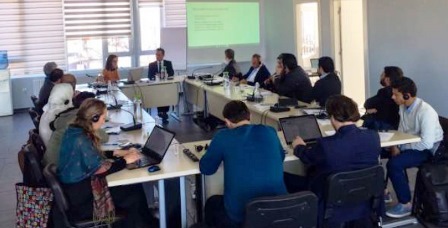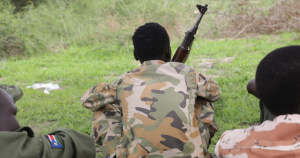Gaziantep, Turkey, 31 October & 3-4 November 2016
The Universal Periodic Review (UPR) is a unique mechanism of the Human Rights Council (HRC) where every UN Member State is reviewed by its peers once every four and a half years. It focuses on the States’ human rights practices and the respect for their human rights obligations.
The Syrian Government had its second review at the UPR Working Group on 31 October 2016. Although this might have been an opportunity for the international community to discuss and, most importantly, provide recommendations on how to break the cycle of violence and impunity in Syria, the conflict in Syria continues to deteriorate and despite the efforts put forward by Mr de Mistura and other international initiatives there are few prospects of an end in sight to the conflict. According to UN sources, between 250,000 and 470,000 people have been killed since 2011; over half the population forced from their homes out of fear and want; some 4.6 million people eke out a minimal existence in places that few can leave and aid cannot reach; and a further 4.8 million people, including an estimated 2 million children, have fled the country.
The range of violations of international humanitarian law and war crimes continues to widen and the number of parties to the conflict allegedly involved in human rights abuses and violation of international norms continues to grow. The conflict has fractured Syria along sectarian lines, divided the country into an unstable patchwork of competing military zones and threatens the peace and stability of the entire region.
The UPR is one mechanism that can try to hold the Syrian Government accountable and pressure it to stop the violations that continue to take place on its territory. It aims to push Syria to uphold the rights it claims to support by signing onto various treaties, such as the Convention against Torture, yet continues to violate. Civil society has a fundamental role to play in the UPR process. Many international and Syrian NGOs and CSOs took part in the preparatory stage of the UPR by submitting reports on the situation of human rights in Syria. Furthermore, the follow up to the recommendations provided by the UPR Working Group is the most critical stage of the whole process. UN Member States have no obligation to report on the implementation of the UPR recommendations, therefore the pressure and follow up of civil society groups is the main way that could lead to the effective implementation of recommendations.
It is crucial that Syrian CSOs share their evaluation and analysis of the work undertaken by the Syrian Government in-between its two reviews, and engage in follow-up at the national and international level.
To that end NPWJ sought to engage Syrian organisations and actors in the UPR process by organising a screening and panel discussion with experts, which was held at NPWJ office in Gaziantep. On 31 October, NPWJ screened the live full session of the UPR Working Group on Syria, for Syrian actors to watch and engage in discussion with each other. This was followed by a two day workshop with experts on the UPR process and international affairs, to discuss and share insider experience of the mechanism. They led a discussion and answered questions on Syria’s session and what to expect for the rest of the UPR process. The second day went over strategies for civil society engagement and possible advocacy steps.
The workshop aimed to build knowledge and increase awareness about the roles and potential of the UPR in the promotion of human rights and to build the capacity of local CSOs in their advocacy efforts towards international actors, as well as improving the cooperation and collaboration of Syrian groups in their planning and implementation of advocacy. It is crucial to continue to support Syrian civil society as they work tirelessly to improve the situation of their country and strive to build a State that upholds and protects the rights of all its citizens. Enhancing the abilities of CSOs to communicate clearer and more effective messages to the government, the UN, other States, INGOs and other Syrians, is one method of trying to achieve that goal.
This workshop was supported by the European Commission.
Background
NPWJ has supported the Syrian civil society since the inception of the Syrian crisis and, since October 2013, has established an office in Gaziantep, Turkey, from where it conducts its Syria-related activities by empowering and increasing the capacity of Syrian CSOs and democratic activists to act and advocate for transitional justice and accountability for war crimes and crimes against humanity.
Documentation:
- Final report of the workshop
- Visit the special page dedicated to NPWJ’s Syria Project on Justice and Accountability
For further information, please contact Gianluca Eramo (MENA Democracy program Coordinator) on geramo@npwj.org or Nicola Giovannini (Press & Public Affairs Coordinator) on ngiovannini@npwj.org or +32-2-548-3915.



